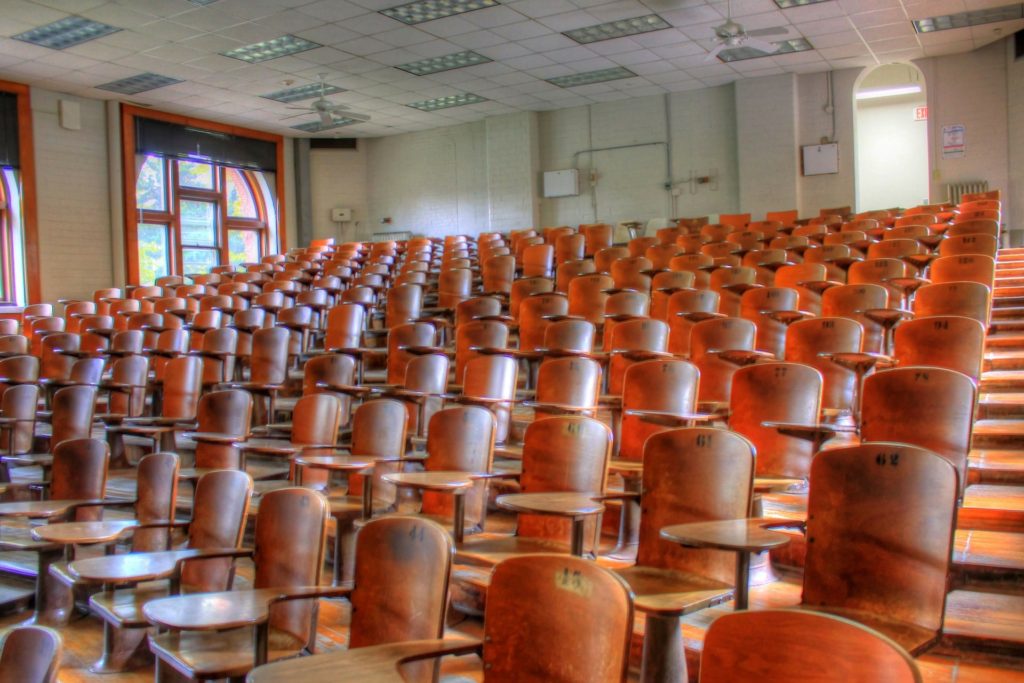Are you wondering what will happen to colleges after this coronavirus pandemic is through? Here is the conclusion in my book, The Lean Career, where I predict what will happen to colleges across the US if a recession occurs.
The Lean Career Prediction
There are many very smart people who predict the downfall of our university system in the coming years. Will colleges collapse like the newspaper industry? What will this downfall look like, and what will the future of education entail?
Clay Christensen is a Harvard professor and author of one of the best-known books on innovation, The Innovator’s Dilemma. He also wrote a book titled The Innovative University. He’s been studying and teaching how industries have entirely changed through technological innovation for years and even coined the term disruptive innovation which you will likely hear at some point in your career.
Christensen has predicted that 50% of all universities will be bankrupt in the US within 10-15 years. In 2017 he even doubled down on that claim by lowering his estimate to maybe nine years.
Another prominent person with a deep understanding of higher education is Jeff Selingo. He has been writing about higher education for over 20 years and published three books on the subject with his most popular being College Unbound.
Jeff talks about how while he doesn’t think all universities will just disappear, he does believe they will be radically different places in ten years with a personalized online, hybrid education being a big part of that change.
Have you ever heard someone say that we are in a student loan bubble or a college bubble? There are many people that will throw these phrases around on the news, yet they never take the time to explain what this means and what kind of impact it will have. Let’s start by defining what a bubble is.
Investopedia’s definition of a bubble is “an economic cycle characterized by the rapid escalation of asset prices followed by a contraction. It is created by a surge in asset prices unwarranted by the fundamentals of the asset and driven by exuberant market behavior. When no more investors are willing to buy at the elevated price, a massive selloff occurs, causing the bubble to deflate.”
In layman’s terms, this means that if something is priced higher than it is worth, then the price will go down all at once. So, what is college worth? In chapter two, you learned about the value of college being composed of three parts: the network, the education, and the experience.
The value of the network of a college degree continues to decrease as more and more companies such as Google, IBM, and Apple speak publicly on how they no longer require degrees for many positions. There have also been many people talking about how students shouldn’t go to college and all the abundant alternatives.
Also, the amount of people working as hiring managers in companies without degrees has continued to rise. The value of the network comes from how many people think having a degree is important, and the level of importance they place on it. Since these two factors have continued to erode, the value of the network has also eroded with it.
The value of the education also continues to decrease at a very fast pace as online education becomes readily available to everyone at a fraction of the price. Why would you pay $100,000 to learn about economics from an average state school professor when you could learn it from some of the smartest people in the world for nearly free?
The internet has allowed for full in-depth course material to always be up to date and accessed by anyone. Instead of one teacher giving a lecture to the 100 students they have in a class, they can instead give that lecture to a million people from around the world without having any of the infrastructure cost that comes with being in a classroom.
The Coronavirus has caused every school to close and require students to learn online from home. This has planted seeds in millions of students’ brains as to why they should pay so much money for information that can be learned without any of these costs.
The last part of the value is the experience. This value has continued to rise over the years as colleges use the experience as their primary way to attract students. However, the problem with this is that the experience isn’t what gets people jobs like 80% of freshmen enrolled in college want.
This means that when people think they are buying insurance for their future or an investment to get a good job, they are actually just buying a consumption good in the form of the college experience. While this experience is worth something, most people wouldn’t be willing to pay the inflated price if they realized it was only a consumption good.
So, what does this mean? Well, the value of college continues to decrease rapidly as the cost of college continues to increase rapidly. This causes the return on investment also to decrease rapidly, making the college degree much less valuable from a financial perspective.
The current student loan default rate is 11% and increasing. Jeff Selingo noted that a survey, run in 2018 by the Chronicle of Higher Education, Council of Independent Colleges, and the American Association of State Colleges and Universities, found 55% of private colleges and 52% of public colleges fell short of their net-tuition revenue. The same survey found that 44% of public colleges and 52% of private colleges didn’t meet their enrollment goals.
With all these numbers increasing while being in one of the best economies in history, it’s easy to see why people like Mark Cuban think we are in a bubble.
I predict that when the economy goes into another downturn, and many of the entry-level jobs are lost, then this student loan default rate will skyrocket. This is when people will realize that the asset value (price of college) is too high and unwarranted by the fundamentals of the asset (ability to get high paying jobs). This will pop the bubble as no more investors (students and parents) will be willing to buy at the elevated price. This will cause a massive sell-off to occur (people no longer enrolling in college). The bubble will then deflate (many colleges will go bankrupt and disappear or restructure).
The reason this affects you is because the value of having a college degree will significantly decrease after this bubble bursts, making the degree itself nearly worthless. This is due to the network of many colleges disappearing as they go bankrupt and the vast amount of companies that will stop requiring degrees.
You don’t want to owe huge amounts of money on a degree that isn’t worth anything in a down economy where it’s hard to get a good-paying job. If you look back around 2008 when the economy tanked, the recent graduates also had a tough time. Many of the students that graduated in the recession had to move back home with their parents since they couldn’t find a job to support themselves.
Hiring projections according to the National Association of Colleges and Employers went down nearly 22% in Spring of 2009. The Education Department’s National Center for Education Statistics said that Americans who received bachelor’s degrees in 2008 were roughly twice as likely to be unemployed after a year than were their peers who graduated in 1993 and 2000.
Some estimate that it can take as long as 15 years for students that graduated in the recession to catch up to students who graduated just a few years later. Imagine all of this but many times worse. That’s what you can expect when the college bubble bursts What happens to education after the bubble pops? Imagine seeing your friends with over $40,000 in debt struggle to get jobs in restaurants or fast food that pay minimum wage.
After students see many of their peers significantly crippled by loads of debt with no job prospects, I predict the number one thing on their minds would be to get training that leads directly to a good career without going into debt.
This will most likely lead students to look for different types of online education with four-year degrees being a thing of the past for many. The universities that do survive the initial wave from a substantial decrease in enrollment will have to significantly increase tuition for the students that remain to cover their high fixed costs.
The value of college degrees will simultaneously decrease at an incredibly fast pace as companies will continue dropping degree requirements and developing hiring pools from the places where the talent is. This will cause students to graduate with a much larger amount of debt for a piece of paper whose value is nearly non-existent.
If the student loan default rate reaches numbers too high, then I think Americans will have a very serious conversation about whether we should put a plan in place to forgive student debt and restrict student loan funding to stop this from happening again.
This is the point when even well-known public universities could go bankrupt and must restructure. Perhaps the state would save specific parts of the university like the sports teams or research programs. It’s hard to say what will happen, but this could very well be comparable to the government bailing out the banks in 2008.




